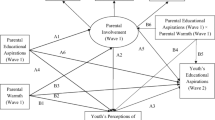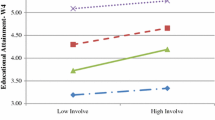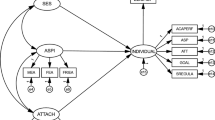Abstract
The contribution that parental educational expectations for youth and youth’s perceptions of academic competence can have on youth’s own educational expectations across early to late adolescence is not well-understood. In a sample of Mexican-origin families, the current study examined longitudinal (from early to late adolescence) associations among mothers, fathers, and youth’s educational expectations, how youth’s educational expectations were associated with perceived academic competence, and the potential mediating role of youth’s perceived academic competence. Data from two-parent families which included one focal child (7th grade: N= 469; youth: Mage = 12.31, 50% female) at three waves (7th, 9th, and 11th grade) were utilized. Structural equation modeling and multi-group analysis were implemented to assess the study’s goals. Results revealed significant associations among parents’ 7th grade educational expectations and youth’s 9th and 11th grade educational expectations. The findings also revealed three significant associations among youth’s perceived academic competence and educational expectations between 7th and 11th grade. Specifically, youth’s 7th grade perceived academic competence predicted youth’s 9th grade educational expectations, youth’s 7th grade educational expectations predicted youth’s 9th grade perceived academic competence, and youth’s 9th grade perceived academic competence predicted youth’s 11th grade educational expectations. Multigroup analysis did not reveal gender differences for the associations tested. The findings highlight the long-term significance of parents’ educational expectations on youth’s educational expectations and underscore youth’s academic competence, an individual level factor, as critical to consider for understanding educational expectations across adolescence for Mexican-origin youth.


Similar content being viewed by others
References
Altschul, I. (2012). Linking socioeconomic status to the academic achievement of Mexican American youth through parent involvement in education. Journal of the Society for Social Work and Research, 3(1), 13–30. https://doi.org/10.5243/jsswr.2012.2.
Alvarez, L. (2007). ¿Derecho u Obligación? Parents’ and youths’ understanding of parental legitimacy in a Mexican origin familial context. Hispanic Journal of Behavioral Sciences, 29(2), 192–208.
Andrew, M., & Hauser, R. M. (2011). Adoption? Adaptation? Evaluating the formation of educational expectations. Social Forces, 90(2), 497–520. https://doi.org/10.1093/sf/sor005.
Aretakis, M. T., Ceballo, R., Suarez, G. A., & Camacho, T. C. (2015). Investigating the immigrant paradox and Latino adolescents’ academic attitudes. Journal of Latina/o Psychology, 3(1), 56–69. https://doi.org/10.1037/lat0000031.
Behnke, A. O., Piercy, K. W., & Diversi, M. (2004). Educational and occupational aspirations of Latino youth and their parents. Hispanic Journal of Behavioral Sciences, 26(1), 16–35. https://doi.org/10.1177/0739986303262329.
Benner, A. D., & Mistry, R. S. (2007). Congruence of mother and teacher educational expectations and low-income youth’s academic competence. Journal of Educational Psychology, 99(1), 140–153. https://doi.org/10.1037/0022-0663.99.1.140.
Bentler, P. M. (1990). Comparative fit indexes in structural models. Psychological Bulletin, 107(2), 238–246. https://doi.org/10.1037/0033-2909.107.2.238.
Brown, M. W. & Cudeck, R. (1993). Alternative ways of assessing model fit. In K.A. Bollen and J.S. Long (Eds), Testing structural equation models (pp. 136–162). Newbury Park, CA: Sage.
Bush, K. R., & Peterson, G. W. (2013). Parent–child relationships in diverse contexts. In Handbook of marriage and the family (pp. 275–302). Boston, MA: Springer.
Cabrera, N. J., & Bradley, R. H. (2012). Latino fathers and their children. Child Development. Perspectives, 6(3), 232–238. https://doi.org/10.1111/j.1750-8606.2012.00249.x.
Ceballo, R., Maurizi, L. K., Suarez, G. A., & Aretakis, M. T. (2014). Gift and sacrifice: parental involvement in Latino adolescents’ education. Cultural Diversity & Ethnic Minority. Psychology, 20(1), 116–127. https://doi.org/10.1037/a0033472.
Chavira, G., Cooper, C. R., & Vasquez-Salgado, Y. (2016). Pathways to achievement: career and educational aspirations and expectations of Latina/o immigrant parents and early adolescents. Journal of Latinos and Education, 15(3), 214–228. https://doi.org/10.1080/15348431.2015.1131693.
Conger, R. D., Conger, K. J., & Martin, M. J. (2010). Socioeconomic status, family processes, and individual development. Journal of Marriage and Family, 72(3), 685–704. https://doi.org/10.1111/j.1741-3737.2010.00725.x.
Conger, R. D., & Elder, Jr., G. H. (1994). Families in troubled times. New York: Aldine De Gruyter.
Cox, M., & Paley, B. (1997). Families as systems. Annual Review of Psychology, 48(1), 243–267. https://doi.org/10.1146/annurev.psych.48.1.243.
Cupito, A. M., Stein, G. L., & Gonzalez, L. M. (2014). Familial cultural values, depressive symptoms, school belonging and grades in Latino adolescents: does gender matter? Journal of Child and Family Studies, 24(6), 1638–1649. https://doi.org/10.1007/s10826-014-9967-7.
de Brey, C., Musu, L., McFarland, J., Wilkinson-Flicker, S., Diliberti, M., Zhang, A., … & Wang, X. (2019). Status and Trends in the Education of Racial and Ethnic Groups 2018. NCES 2019–038. National Center for Education Statistics.
Eccles, J., & Wigfield, A. (2002). Motivational beliefs, values, and goals. Annual Review of Psychology, 53(1), 109–132. https://doi.org/10.1146/annurev.psych.53.100901.135153.
The Economics Daily. (2015). Educational attainment and occupation groups by race and ethnicity in 2014. The Economics Daily. https://www.bls.gov/opub/ted/2015/educational-attainment-and-occupation-groups-by-race-and-ethnicity-in-2014.htm.
Fan, W., & Williams, C. (2010). The effects of parental involvement on students’ academic self-efficacy, engagement and intrinsic motivation. Educational Psychology, 30(1), 53–74. https://doi.org/10.1080/01443410903353302.
Froiland, J. M., & Davison, M. L. (2014). Parental expectations and school relationships as contributors to adolescents’ positive outcomes. Social Psychology of Education, 17(1), 1–17. https://doi.org/10.1007/s11218-013-9237-3.
Froiland, J. M., & Oros, E. (2014). Intrinsic motivation, perceived competence and classroom engagement as longitudinal predictors of adolescent reading achievement. Educational Psychology, 34(2), 119–132.
Froiland, J. M., & Worrell, F. C. (2017). Parental autonomy support, community feeling and student expectations as contributors to later achievement among adolescents. Educational Psychology, 37(3), 261–271.
Gándara, P., & Mordechay, K. (2017). Demographic change and the new (and not so new) challenges for Latino education. The Educational. Forum, 81(2), 148 https://doi.org/10.1080/00131725.2017.1280755.
Graham, J. W. (2003). Adding missing-data-relevant variables to FIML-based structural equation models. Structural Equation Modeling: A Multidisciplinary Journal, 10(1), 80–100. https://doi.org/10.1207/S15328007SEM1001_4.
Hayes, D., Blake, J. J., Darensbourg, A., & Castillo, L. G. (2015). Examining the academic achievement of Latino adolescents: the role of parent and peer beliefs and behaviors. The Journal of Early Adolescence, 35(2), 141–161. https://doi.org/10.1177/0272431614530806.
Hernández, M. M., Robins, R. W., Widaman, K. F., & Conger, R. D. (2016). School belonging, generational status, and socioeconomic effects on Mexican-Origin children’s later academic competence and expectations. Journal of Research on Adolescence, 26(2), 241–256. https://doi.org/10.1111/jora.12188.
Hossler, D., Schmit, J. L., & Vesper, N. (1999). Going to college: How social, economic, and educational factors influence the decisions students make. Baltimore, MD: Johns Hopkins University Press.
Hox, J. J., Moerbeek, M., & Schoot, Rvd (2018). Multilevel analysis: techniques and applications. Third Ed. New York, NY: Routledge.
Hu, L., & Bentler, P. M. (1999). Cutoff criteria for fit indexes in covariance structure analysis: conventional criteria versus new alternatives. Structural Equation Modeling: A Multidisciplinary Journal, 6(1), 1–55. https://doi.org/10.1080/10705519909540118.
Hurtado-Ortiz, M. T., & Gauvain, M. (2007). Postsecondary education among Mexican American youth: contributions of parents, siblings, acculturation, and generational status. Hispanic Journal of Behavioral Sciences, 29(2), 181–191. https://doi.org/10.1177/0739986307299584.
Ibañez, G. E., Kuperminc, G. P., Jurkovic, G., & Perilla, J. (2004). Cultural attributes and adaptations linked to achievement motivation among Latino adolescents. Journal of Youth and Adolescence, 33(6), 559–568. https://doi.org/10.1023/B:JOYO.0000048069.22681.2c.
Karlson, K. B. (2015). Expectations on track? High school tracking and adolescent educational expectations. Social Forces, 94(1), 115–141. https://doi.org/10.1093/sf/sov006.
Keefe, S. E. (1984). Real and ideal extended familism among Mexican Americans and Anglo Americans: on the meaning of “close” family ties. Human Organization, 43(1), 65–70. https://doi.org/10.17730/humo.43.1.y5546831728vn6kp.
Kirk, C., Lewis-Moss, R., Nilsen, C., & Colvin, D. (2011). The role of parent expectations on adolescent educational aspirations. Educational Studies, 37(1), 89–99. https://doi.org/10.1080/03055691003728965.
Kiyama, J. M. (2010). College aspirations and limitations: the role of educational ideologies and funds of knowledge in Mexican American families. American Educational Research Journal, 47(2), 330–356. https://doi.org/10.3102/0002831209357468.
Little, R. J. A. (1988). A test of missing completely at random for multivariate data with missing values. Journal of the American Statistical Association, 83(404), 1198–1202. https://doi.org/10.1080/01621459.1988.10478722.
MacKinnon, D., Lockwood, C., & Williams, J. (2004). Confidence limits for the indirect effect: distribution of the product and resampling methods. Multivariate Behavioral Research, 39(1), 99–128.
Marsh, H. W., Ellis, L. A., Parada, R. H., Richards, G., & Heubeck, B. G. (2005). A short version of the self-description questionnaire II: operationalizing criteria for short-form evaluation with new applications of confirmatory factor analyses. Psychological Assessment, 17(1), 81–102. https://doi.org/10.1037/1040-3590.17.1.81.
McWhirter, E. H., Torres, D. M., Salgado, S., & Valdez, M. (2007). Perceived barriers and postsecondary plans in Mexican American and white adolescents. Journal of Career Assessment, 15(1), 119–138. https://doi.org/10.1177/1069072706294537.
Melby, J. N., & Conger, R. D. (1996). Parental behaviors and adolescent academic performance: a longitudinal analysis. Journal of Research on Adolescence, 6, 113–137.
Mistry, R. S., White, E. S., Benner, A. D., & Huynh, V. W. (2009). A longitudinal study of the simultaneous influence of mothers’ and teachers’ educational expectations on low-income youth’s academic achievement. Journal of Youth and Adolescence, 38(6), 826. https://doi.org/10.1007/s10964-008-9300-0.
Muenks, K., Wigfield, A., & Eccles, J. S. (2018). I can do this! The development and calibration of children’s expectations for success and competence beliefs. Developmental Review, 48, 24–39. https://doi.org/10.1016/j.dr.2018.04.001.
Muthén, L. K., & Muthén, B. O. (2012). Mplus user’s guide (1998–2012). Los Angeles, CA: Muthén & Muthén, 6.
Olivier, E., Archambault, I., De Clercq, M., & Galand, B. (2019). Student self-efficacy, classroom engagement, and academic achievement: comparing three theoretical frameworks. Journal of Youth and Adolescence, 48(2), 326–340. https://doi.org/10.1007/s10964-018-0952-0.
Perez-Brena, N. J., Delgado, M. Y., Rodríguez De, Jesús, Sue, A., Updegraff, K. A., & Umaña-Taylor, A. J. (2017). Mexican-origin adolescents’ educational expectation trajectories: intersection of nativity, sex, and socioeconomic status. Journal of Applied Developmental Psychology, 48, 14–24. https://doi.org/10.1016/j.appdev.2016.11.001.
Piña-Watson, B., Lorenzo-Blanco, E. I., Dornhecker, M., Martinez, A. J., & Nagoshi, J. L. (2016). Moving away from a cultural deficit to a holistic perspective: traditional gender role values, academic attitudes, and educational goals for Mexican descent adolescents. Journal of Counseling Psychology, 63(3), 307–318. https://doi.org/10.1037/cou0000133.
Riina, E. M., & McHale, S. M. (2014). Bidirectional influences between dimensions of coparenting and adolescent adjustment. Journal of Youth and Adolescence, 43(2), 257–269. https://doi.org/10.1007/s10964-013-9940-6.
Roeser, R. W. (2006). On the study of educational and occupational life-paths in psychology: commentary on the special issue. Educational Research and Evaluation, 12, 409–421.
Saenz, V.B., & Ponjuan, L. (2011). Men of color: ensuring the academic success of Latino males in higher education. Washington, DC: Institute for Higher Education Policy.
Sánchez, B., Colón, Y., & Esparza, P. (2005). The role of sense of school belonging and gender in the academic adjustment of Latino adolescents. Journal of Youth and Adolescence, 34(6), 619–628.
Schafer, J., & Graham, J. (2002). Missing data: our view of the state of the art. Psychological Methods, 7(2), 147–177. https://doi.org/10.1037//1082-989X.7.2.147.
Shanahan, L., McHale, S. M., Crouter, A. C., & Osgood, D. W. (2007). Warmth with mothers and fathers from middle childhood to late adolescence: within- and between-families comparisons. Developmental Psychology, 43(3), 551–563. https://doi.org/10.1037/0012-1649.43.3.551.
Simpkins, S., Fredricks, J., & Eccles, J. (2012). Charting the Eccles’ expectancy-value model from mothers’ beliefs in childhood to youths’ activities in adolescence. Developmental Psychology, 48(4), 1019–1032. https://doi.org/10.1037/a0027468.
Stein, G. L., Cupito, A. M., Mendez, J. L., Prandoni, J., Huq, N., & Westerberg, D. (2014). Familism through a developmental lens. Journal of Latina/o Psychology, 2(4), 224.
Stein, G. L., Gonzalez, L. M., Cupito, A. M., Kiang, L., & Supple, A. J. (2015). The protective role of familism in the lives of latino adolescents. Journal of Family Issues, 36(10), 1255–1273. https://doi.org/10.1177/0192513X13502480.
Steinberg, L., & Silverberg, S. B. (1986). The vicissitudes of autonomy in early adolescence. Child Development, 57(4), 841–851. https://doi.org/10.1111/j.1467-8624.1986.tb00250.x.
Taylor, B. A., & Behnke, A. (2005). Fathering across the border: Latino fathers in mexico and the U.S. Fathering: A Journal of Theory, Research, and Practice about Men as Fathers, 3(2), 99–120. https://doi.org/10.3149/fth.0302.99.
Tierney, W.G., Colyar, J.E., & Corwin, Z.B. (2003). Preparing for college: building expectations, changing realities.
Trevelyan, E., Gambino, C., Gryn, T., Larsen, L., Acosta, Y., Grieco, E., & Walters, N. (2016). Characteristics of the US population by generational status: 2013. Washington, DC: US Government Printing Office.
Tucker, L. R., & Lewis, C. (1973). A reliability coefficient for maximum likelihood factor analysis. Psychometrika, 38(1), 1–10. https://doi.org/10.1007/BF02291170.
Updegraff, K. A., Delgado, M. Y., & Wheeler, L. A. (2009). Exploring mothers’ and fathers’ relationships with sons versus daughters: Links to adolescent adjustment in mexican immigrant families. Sex Roles, 60(7), 559–574. https://doi.org/10.1007/s11199-008-9527-y.
Walsh, K. J., & Robinson Kurpius, S. E. (2016). Parental, residential, and self-belief factors influencing academic persistence decisions of college freshmen. Journal of College Student Retention: Research, Theory & Practice, 18(1), 49–67. https://doi.org/10.1177/1521025115579672.
Wigfield, A., & Cambria, J. (2010). Expectancy-value theory: retrospective and prospective. In The decade ahead: Theoretical perspectives on motivation and achievement (pp. 35–70). Bingley, United Kingdom: Emerald Group Publishing Limited.
Wigfield, A., & Eccles, J. S. (2000). Expectancy–value theory of achievement motivation. Contemporary Educational Psychology, 25(1), 68–81. https://doi.org/10.1006/ceps.1999.1015.
Yamamoto, Y., & Holloway, S. D. (2010). Parental expectations and children's academic performance in sociocultural context. Educational Psychology Review, 22(3), 189–214. https://doi.org/10.1007/s10648-010-9121-z.
Acknowledgements
We would like to acknowledge all the families that participated in the California Families Project. The authors are also grateful for the staff and research assistants who assisted in this study.
Authors’ Contributions
L.A. conceived the study, performed the statistical analysis, and drafted the manuscript; M.B. helped conceive the study and drafted the manuscript; R.R. participated in the design and coordination of the study and performed the measurement. All authors read and approved the final manuscript.
Funding
This study was funded by a grant from the National Institute on Drug Abuse and the National Institute on Alcohol Abuse and Alcoholism (DA017902) to the third author. In addition, funding was also received by the first author from Institute of Education Sciences, U.S. Department of Education, through grant R305B090007 to The Pennsylvania State University. The opinions expressed are those of the authors and do not represent the views of the Institute or the U.S. Department of Education. The authors are grateful for the participating families, staff and research assistants who took part in this study.
Data Sharing and Declaration
This manuscript’s data will not be deposited.
Author information
Authors and Affiliations
Corresponding author
Ethics declarations
Conflict of Interest
The authors declare that they have no conflict of interest.
Ethical Approval
All procedures performed in studies involving human participants were in accordance with the ethical standards of the institutional review board (University California Davis IRB; protocol number: 217484-23) and with the 1964 Helsinki declaration and its later amendments or comparable ethical standards.
Informed Consent
Informed consent was obtained from all individual participants included in the study.
Additional information
Publisher’s note Springer Nature remains neutral with regard to jurisdictional claims in published maps and institutional affiliations.
Appendix A
Appendix A
Rights and permissions
About this article
Cite this article
Aceves, L., Bámaca-Colbert, M.Y. & Robins, R.W. Longitudinal Linkages among Parents’ Educational Expectations, Youth’s Educational Expectations, and Competence in Mexican-origin Families. J Youth Adolescence 49, 32–48 (2020). https://doi.org/10.1007/s10964-019-01161-5
Received:
Accepted:
Published:
Issue Date:
DOI: https://doi.org/10.1007/s10964-019-01161-5




